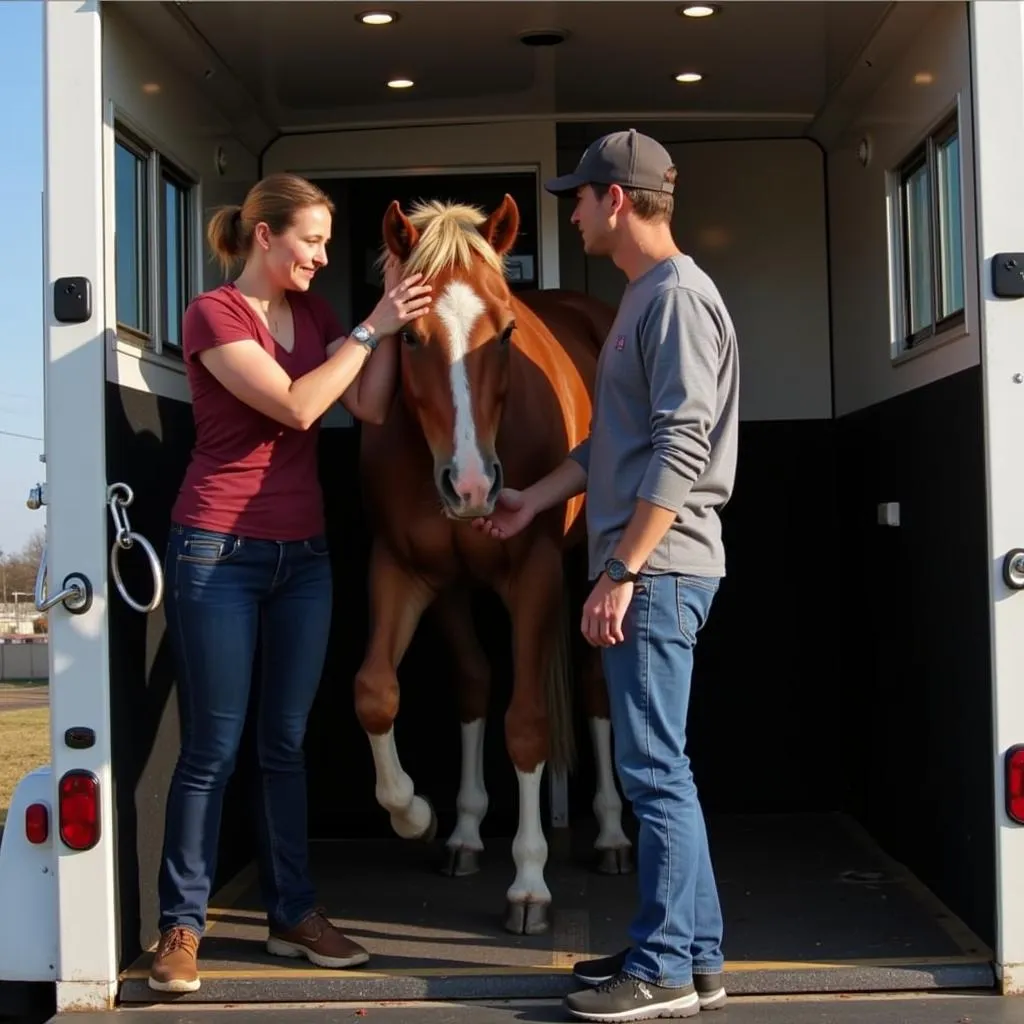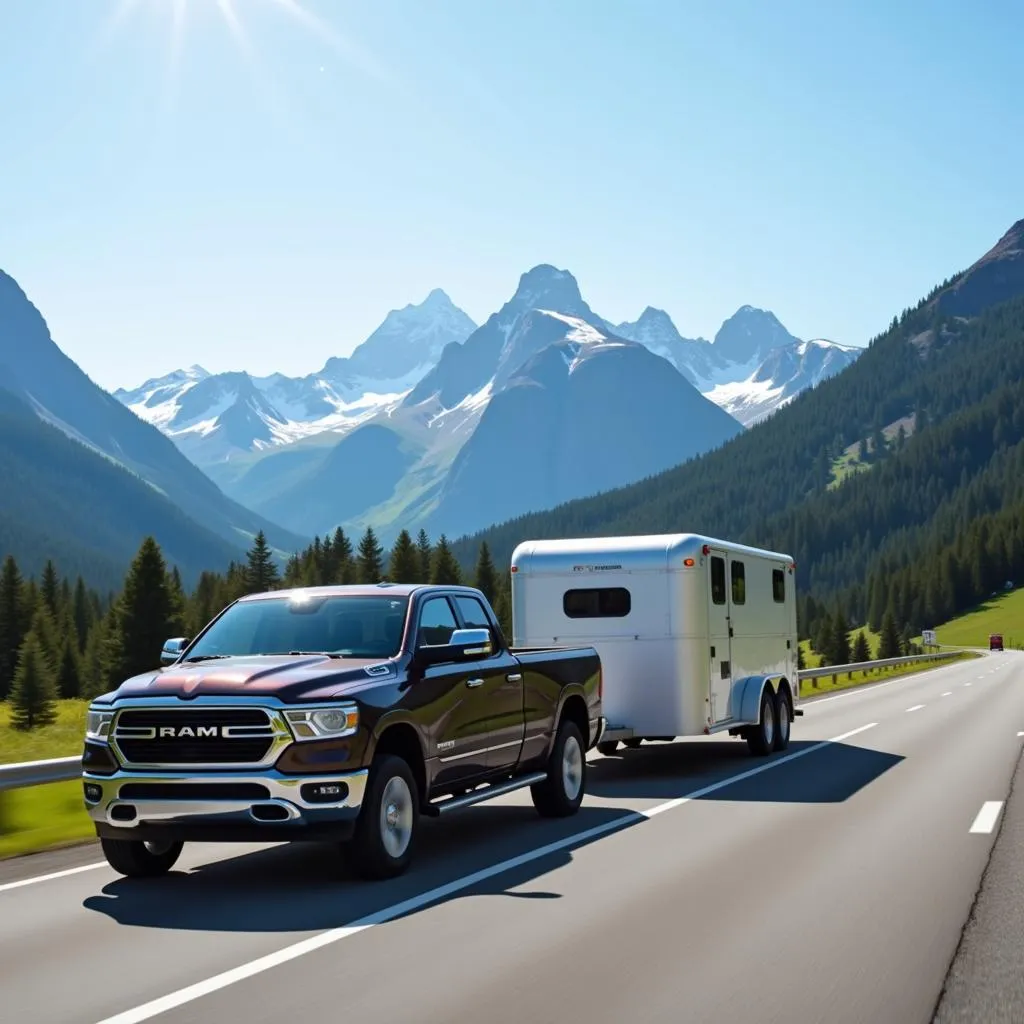Towing a horse trailer safely and responsibly is paramount for the well-being of both you and your equine companion. Whether you’re transporting your horse for a competition, a trail ride, or a visit to the veterinarian, understanding the ins and outs of towing a horse trailer is essential. This guide will equip you with the knowledge and confidence to ensure a smooth and secure journey for you and your horse.
Choosing the Right Horse Trailer
Selecting the appropriate horse trailer is the foundation for safe towing. Consider the following factors:
- Size and Weight: The trailer must comfortably accommodate the size and number of horses you intend to transport. Factor in your vehicle’s towing capacity, ensuring it can handle the combined weight of the trailer and horses.
- Type: Bumper pull trailers are suitable for lighter loads, while gooseneck trailers offer greater stability for heavier loads. Slant load trailers maximize space and minimize stress for horses during transit.
- Features: Opt for trailers with adequate ventilation, secure latches, and features that prioritize your horse’s comfort and safety. Padding, non-slip flooring, and adjustable dividers are essential considerations.
Preparing Your Horse for Trailering
Familiarizing your horse with the trailer is crucial for minimizing stress during transport.
- Introduce Gradually: Allow your horse to explore the trailer in a controlled environment. Offer treats and praise to create positive associations.
- Practice Loading and Unloading: Practice loading and unloading calmly and patiently, using positive reinforcement techniques.
- Securely Tie: Use a quick-release knot and ensure the lead rope is the appropriate length to prevent entanglement.
 Loading a Horse into a Trailer
Loading a Horse into a Trailer
Essential Towing Equipment
Equipping your vehicle with the right gear is paramount for safe towing.
- Hitch and Ball Mount: Select a hitch and ball mount with a weight rating exceeding your trailer’s gross trailer weight (GTW).
- Brake Controller: A brake controller ensures synchronized braking between your vehicle and the trailer, especially crucial for emergency situations.
- Weight Distribution Hitch: For heavier trailers, a weight distribution hitch helps level the load and enhances stability.
- Safety Chains: Always cross-connect safety chains beneath the trailer tongue to provide a backup connection in case of hitch failure.
- Trailer Tires: Regularly inspect trailer tires for wear and tear, maintaining proper tire pressure.
- Lights: Verify all trailer lights (brake lights, turn signals, running lights) are functional before each trip.
Safe Driving Practices
Towing a horse trailer demands heightened awareness and adjusted driving techniques.
- Reduce Speed: Adhere to posted speed limits for towing vehicles, and adjust speed based on road conditions and weather.
- Increase Following Distance: Maintain a greater following distance than usual to allow ample braking time.
- Avoid Sudden Maneuvers: Make gradual turns and lane changes to prevent trailer sway.
- Brake Carefully: Anticipate stops and brake gently to avoid jarring your horse.
- Check Your Load: Make frequent stops to check on your horse, ensuring they are safe and comfortable.
 Towing a Horse Trailer on a Scenic Highway
Towing a Horse Trailer on a Scenic Highway
Regular Maintenance
Preventative maintenance is key for preventing breakdowns and ensuring the longevity of your towing setup.
- Trailer Inspections: Regularly inspect your trailer for signs of wear and tear, including tires, brakes, lights, and flooring.
- Vehicle Maintenance: Adhere to your vehicle’s recommended maintenance schedule, paying close attention to brakes, tires, and fluid levels.
- Professional Inspections: Schedule professional trailer and vehicle inspections annually or more frequently if you tow frequently.
Conclusion
Towing a horse trailer safely and responsibly is an ongoing commitment that prioritizes the well-being of both you and your equine partner. By choosing the right equipment, practicing safe driving habits, and prioritizing regular maintenance, you can ensure a stress-free journey for you and a comfortable ride for your horse. Remember, preparation is key when it comes to safe and successful horse transportation.
For expert advice on horse trailers, towing equipment, and horse care, contact Justus Horses USA at 0772127271 or [email protected]. Our team is dedicated to providing you with the resources you need to become a confident and responsible horse owner. Visit our location at QGM2+WX2, Vị Trung, Vị Thuỷ, Hậu Giang, Việt Nam, to explore our wide selection of horse trailers and accessories.